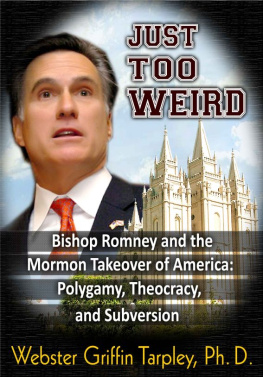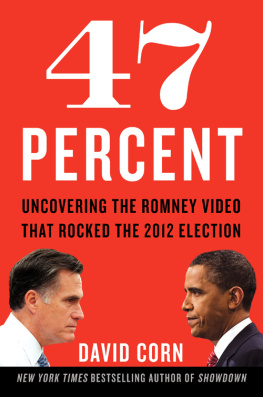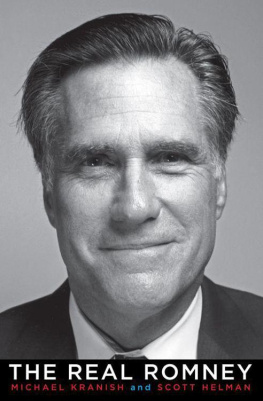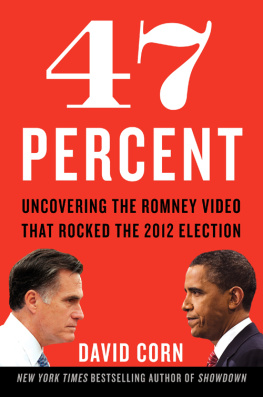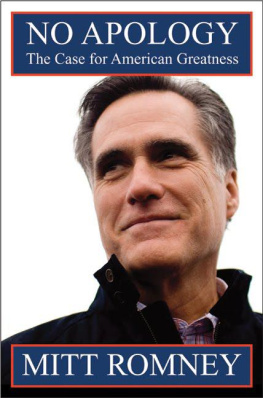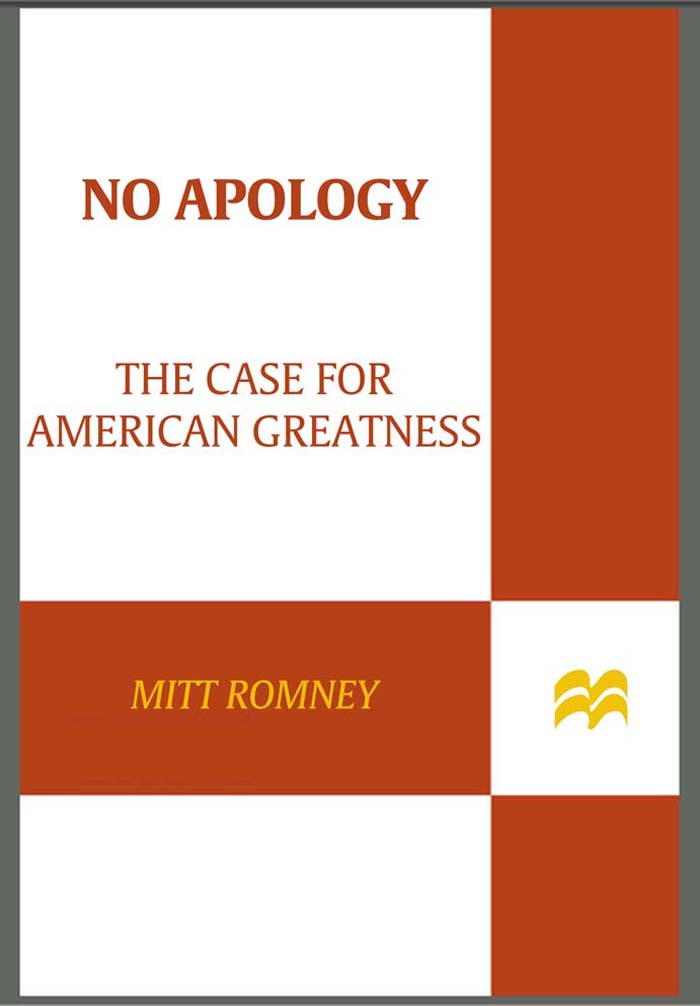No
Apology

ALSO BY MITT ROMNEY
Turnaround:
Crisis, Leadership, and the Olympic Games
No
Apology

THE CASE FOR
AMERICAN GREATNESS

Mitt Romney

ST. MARTINS PRESS
NEW YORK
The extract on pages 17778 were originally published in The New Yorker. The charts
that appear on pages 140, 141, 207, 209, and 238 are reprinted with permission.
NO APOLOGY . Copyright 2010 by Mitt Romney. All rights reserved. Printed in the
United States of America. For information, address St. Martins Press,
175 Fifth Avenue, New York, N.Y. 10010.
www.stmartins.com
Design by Kathryn Parise
ISBN 978-0-312-60980-1
First Edition: March 2010
10 9 8 7 6 5 4 3 2 1
To Allie, Joe, Thomas, Chloe, Nick, Mia,
Nate, Grace, Wyatt, Owen, Nash, Soleil, Parker, Miles,
and all of Anns and my grandchildren yet unborn
We must be ready to dare all for our country.
For history does not long entrust the care of freedom to the weak or the timid.
D WIGHT D. E ISENHOWER
Contents

No
Apology

Introduction

R unning for president of the United States is an extraordinary experience. New, profound friendships are unquestionably the greatest reward; they will last a lifetime. And there were moments of laughter, such as when Ann got up from a collapsed stage in Dubuque, Iowa, dusted herself off, and later ad-libbed, Well, I fell on de butt in Dubuque. There were times of exhilaration: winning the Michigan primary, the state where I was raised and where my dad had served three terms as governor, was one of them. And then there were the inevitable lessons learned. My dad, George Romney, used to say of his 1968 presidential campaign that it was like a miniskirt... short and revealing. Mine was a little longer, but just as revealing.
Ive run for office three times, losing twice, winning once. Each time, when the campaign was over, I felt that I hadnt done an adequate job communicating all that I had intended to say. Some of that is because debate answers are limited to sixty seconds, ads are thirty seconds, and lengthy position papers are rarely read at all. This book gives me a chance to say more than I did during my campaign.
That established, my interest in writing the book goes back well before my political life. My career in the private sector exposed me to developments abroad and conditions at home that were deeply troubling. At the same time, I saw that most of us were not aware of the consequences of blithely continuing along our current course: We have become so accustomed to the benefits of Americas greatness that we cannot imagine any significant disruption of what we have known.
I was reminded of a book I had read when I was in France during the late 1960s. Jean-Jacques Servan-Schreiber was a journalist and a businessperson, and he became convinced that France and Europe were in danger of falling far and irretrievably behind the United States. His book, The American Challenge, stirred his countrymen to action and helped galvanize pan-European economic and political collaboration. While I am sufficiently realistic to recognize that this volume is highly unlikely to have as great an impact as did his, it is my hope that it will affect the thinking and perspectives of those who read it.
Thus, this is not a collection of my positions on all the important issues of the day; in fact, a number of issues I care about are not included. This is not a policy book that explores issues in greater depth than do scholars and think tanksI treat topics in a single chapter that others have made the subject of entire volumes. Nor is this an attack piece on all the policies of the Obama administration, although criticism is unavoidable with policies that I believe are the most harmful to the future generations of America.
This is a book about what I believe should be our primary national objective: to keep America strong and to preserve its place as the worlds leading nation. And it describes the course I believe we must take to strengthen the nation in order to remain prosperous, secure, and free.
There are some who may question the national objective I propose. I make no apology for my conviction that Americas economic and military leadership is not only good for America but also critical for freedom and peace across the world. Accordingly, as I consider the various issues before the nation, I evaluate our options largely by whether they would make America stronger or weaker.
In my first chapters, I consider geopolitical threats and lessons from the history of great nations of the past. In subsequent chapters, I describe domestic challenges to our national strength and propose actions to overcome them. My final chapter is intended to provide a means for future Americans to gauge whether we have been successful in setting a course that will preserve Americas greatness throughout the twenty-first century. It describes as well the source of my optimism for Americas future.
These are difficult times: homes have lost value, nest eggs have been eroded, retirees have become anxious about their future, and millions upon millions of Americans are out of work. Inexcusable mistakes and failures precipitated the descent that has hurt so many people. But even as we endure the current shocks, we know that this will not go on forever; we know that because America is a strong and prosperous nation, the economic cycle will eventually right itself and the future will be brighter than the present.
While I will touch upon todays difficulties, my focus is on the growing challenges to the foundations of our national strength. How we confront these challenges will determine what kind of America and world we will bequeath to our children and grandchildren.
This is a book about securing that future of freedom, peace, and prosperity in the only way possible: by strengthening America. A strong America is our only assurance that prosperity will follow hardship and that our lives and liberty will always be secure. The strength of the nation has been challenged beforeat its birth, during the Civil War, in the peril of world wars. It is challenged again today. In our past, Americans have risen to the occasion by confronting the challenge honestly and laying their sacrifice upon the altar of freedom. We must do so again.
1



